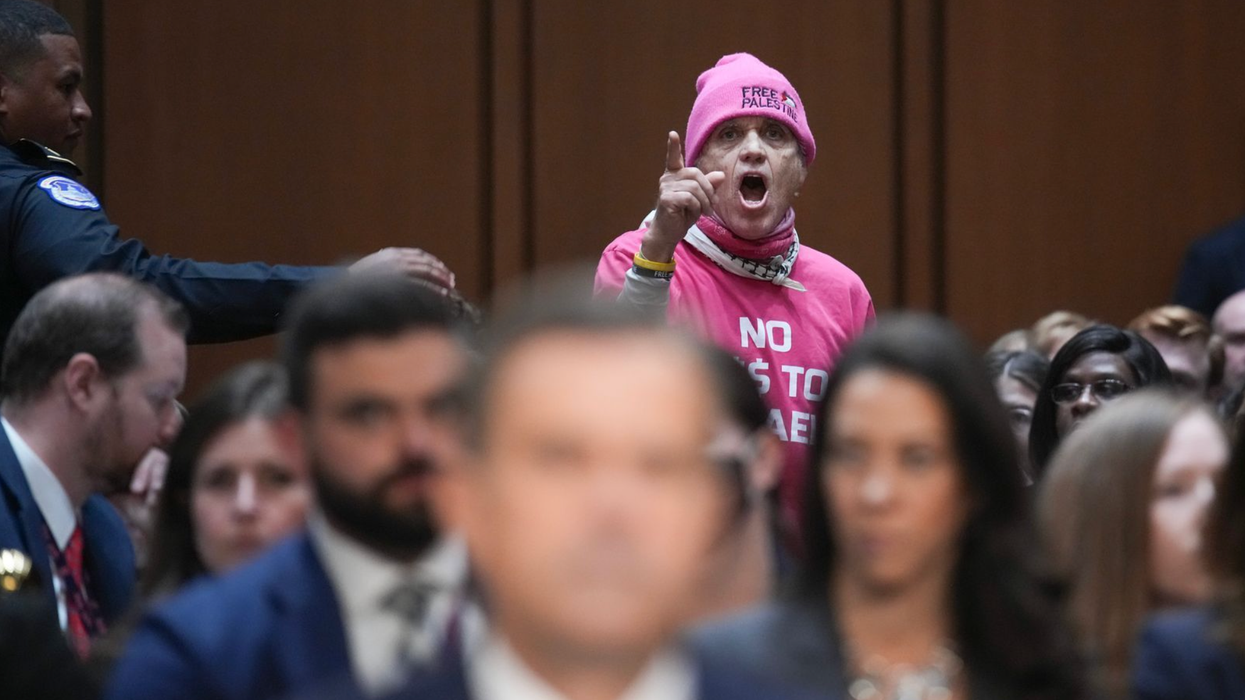As Capitol police were taking Barry out of the hearing room, in the horrific style of the McCarthy hearings in the 1950s, Cotton maliciously said that Barry was a “CODEPINK lunatic that was funded by the Communist Party of China.” Cotton then said if anyone had something to say to do so.
CODEPINK members have been challenging in the U.S. Congress the war policies of five presidential administrations, beginning in 2001 with the Bush wars on Afghanistan and Iraq, long before Sen. Cotton was elected as a U.S. Senator in 2014.
Refusing to buckle or be intimidated by Cotton’s lies about the funding of CODEPINK, I stood up and yelled, “I’m a retired Army colonel and former diplomat. I work with CODEPINK, and it is not funded by Communist China.” I too was hauled out of the hearing room by Capitol police and arrested.
After I was taken out of the hearing room, Cotton libelously continued his McCarthyite lie: “The fact that Communist China funds CODEPINK, which interrupts a hearing about Israel, illustrates Director Gabbard’s point that China, Russia, Iran, and North Korea are working together in greater concert than they ever had before.”
Sen. Cotton does not appreciate the responsibility he has in his one-month-old elevation to the chair of the Senate’s Intelligence Committee.
Sen. Cotton does not seem to care that his untruthful statements in a U.S. congressional hearing aired around the world can have immediate and dangerous consequences for those he lies about, their friends, and family. In today’s polarized political environment, we know that the words of senior leaders can rile supporters into frenzies as we saw on January 6, 2021, with President Donald Trump’s loyal supporters injuring many Capitol police and destroying parts of the nation’s Capitol building in their attempt to stop the presidential election proceedings.
CODEPINK members have been challenging in the U.S. Congress the war policies of five presidential administrations, beginning in 2001 with the Bush wars on Afghanistan and Iraq, long before Sen. Cotton was elected as a U.S. Senator in 2014. We have been in the U.S. Senate offices and halls twice as long as he has. We have nonviolently protested the war policies of former Presidents George W. Bush, Barack Obama, Trump, Joe Biden, and now Trump again.
After getting out of the Capitol Hill police station, a CODEPINK delegation went to Sen. Cotton’s office in the Russell Senate Office building and made a complaint to his office staff.
We are also submitting a complaint to the Senate Ethics Committee over the untrue and libelous statements Sen. Cotton made in the hearing.
The abduction and deportation of international students who joined protests against U.S. complicity in the Israeli genocide of Palestinians in Gaza and ethnic cleansing of the West Bank, the scathing treatment of visitors who have wanted to enter our country, and now the McCarthyite intimidating tactics used by Sen. Cotton in a Senate Intelligence Committee hearing of telling lies about individuals and organizations that challenge the policies of the U.S. government, particularly its complicity in the Israeli genocide of Gaza, must be called out and pushed back against.
And we must push back against U.S. senators who actually receive funding from front groups for other countries. Sen. Cotton has received $1,197,989 from the American Israel Public Affairs Committee (AIPAC) to advocate for the genocidal policies of the State of Israel.




